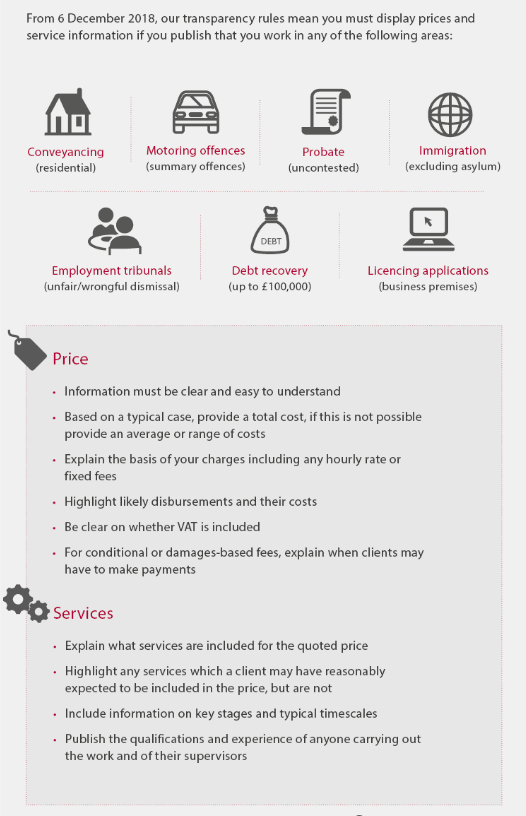2 What are the SRA Transparency Rules and what sanctions can it use to enforce compliance?
Regarding pricing this must be 'clear and easy to understand', conveyancing solicitor firms must:
- Provide total cost or if not possible an average or range of costs
- Have to explain basis of charges, incl. any hourly rates or fixed fees
- Have to 'highlight' 'likely disbursements and their costs'
- Be clear on whether VAT is included
- For conditional fees, explain when clients may have to make payments
Regarding services, conveyancing firms must:
- Explain what services are included for the quoted price
- Highlight any services not included within the price, which a client may reasonably expect to be charged for
- Include information on key stages and typical timescales of these
- Firms without a website must have information available on request in other formats
The SRA gave further advice that a firm's overheads should not be described as disbursements in their advertisements, examples including annual subscription costs and transaction fees for using online solutions to manage business processes, for example Veyo.
It stated that this would not preclude such costs being passed on to clients, for example through an administration charge (as opposed to as a disbursement).
Firms failing to comply face enforcement action, with, according to an SRA representative, 'all sanctions available', including for example fines and ultimately disqualifying them from providing conveyancing services.
3 Why do some residential conveyancing solicitor firms' fees fluctuate?
It's fair to say that conveyancing matters can vary considerably from case-to-case because in simple terms, no two home purchases/sales are the same and here are just a few of the ways in which they differ.
Price of property/ies involved
Fees are invariably priced according to the sale price of the property involved, so you get charged more if your property/ies cost more.
Freehold or Leasehold
You'll always get charged more for a transaction involving a
leasehold rather than a
freehold property because of the extra legal work involved in factoring in the freehold information (including for example, the accounts,
major works etc.) and the resultant lengthier and more complex contracts of sale.
Cash or mortgage
Any transaction which includes a mortgage involves more work because of dealings with at least one lender and so will result in a higher fee.
Other schemes and variants
Routinely, if one property lawyer firm has not had previous dealings with another property lawyer firm, a client is charged for the former firm carrying out a
Lawyer Checker to ensure the
bona fides of the other firm and it will charge the client for this.
Notwithstanding these legitimate differences in costing, conveyancing solicitors can still be clear about charging after they've taken all the correct information from a prospective client, however, and detail all items transparently without burying charges within the small print.
4 What is the average fee for conveyancing?
Conveyancing fees vary and reasonably so, as explained in the previous section, however, according to research from one prominent media source, it typically costs about £1,000 in legal fees to sell the average home, and around £1,200 when buying, with stamp duty on top, making the total around £2,200.
5 Is the issue just about fees?
No. As printed above, the SRA rules concern service levels as well.
Firms must explain what services are included in a quote, but they must highlight services not included which a client might reasonably have to pay for.
Conveyancing solicitors vary greatly in this regard, with some including these services within a fixed fee but others burying them deeply within places like the terms and conditions.
Where property solicitors might have a legitimate concern is the ruling about including information on 'typical timescales': conveyancing is notorious as a branch of law for how difficult it is to predict how long any matter might take to complete.
Because there are many different 'players' involved, such as the buyer, seller, their respective solicitors, possibly lenders, possibly housing associations, possibly Government agencies (e.g. Target), possibly surveyors and so on, and because each has their own tasks to complete and are reliant for some activities on things like the Royal Mail, it's easy to see that timescales can vary considerably.
So although it's commonly said that a freehold transaction should take 6 to 8 weeks, a leasehold transaction should take 8 to 10 weeks and a shared ownership transaction should take 8 to 12 weeks, any particular person's transaction might fall outside these 'typical' timescales.
According to some estimates, perhaps one in three conveyancing transactions actually never complete (because, for example, a
buyer pulls out before exchange).
The key, however, is for firms to be transparent about their typical timescale while explaining, truthfully, what the variables are.
Firms can do much for themselves in this regard by explaining which tasks clients themselves have to achieve to 'do their bit' in keeping timescales as small as possible.
6 How has SAM Conveyancing (always) complied with the regulations?
We've only ever offered fixed fees with a No Sale No Fee guarantee within a transparent quote where ALL costs are broken down and in which all services are explained.
Our online quote is returned to you after asking all the questions for which we need answers in order to make our quote to you as accurate and transparent as possible.
Google Reviews and Trust Pilot
These reviews give evidence that we continue to offer great value prices for the highest and market leading levels of service.
Conveyancing Process tool
All of our clients have access to our Conveyancing Process tool. This keeps track of all activities which occur during any conveyancing transaction and, most importantly, clearly gives estimates of likely timescales, with instructional videos and further reading for each of the 8 main stages of the conveyancing process.
7 How has the industry reacted to the SRA Transparency Rules?
Given that there perhaps 1 million home owners moving every year, any rule changes which result in a better conveyancing experience for clients should be greatly welcomed.
Sheila Kumar, the Council for Licensed Conveyancers' chief executive, welcomed the rules, saying:
"We can now move ahead with the changes to make sure consumers will have access to additional and clearer information to help them make an informed choice when deciding which lawyer to use."
The Law Society stated:
"Solicitors and conveyancers should be wary of trying to entangle more prospective clients by quoting a lower figure than the one they charge."
However, comment from individual conveyancing solicitors in media reports has been mixed, with some arguing that the rules will encourage 'a race to the bottom' with qualities of service suffering alongside firms cutting costs.
During the preceding consultation, the Law Society notably stated that 'one size fits all' pricing did not suit legal services, because of the complexity of legal services. and that the regulatory approach was 'inflexible' and risked pushing the focus onto price competition alone.
According to one media estimate, the number of legal firms offering conveyancing has dropped by 700 to 4,100 in the last 5 years and more pessimistic commentators predict that this trend might well accelerate as a result of the rule changes.
 seeking to charge clients £200 to prioritise their files in order to achieve a Christmas completion in one particularly bad example of cynical opportunism. Both regulators and the media condemned the firm for acting in the way.
seeking to charge clients £200 to prioritise their files in order to achieve a Christmas completion in one particularly bad example of cynical opportunism. Both regulators and the media condemned the firm for acting in the way. 









